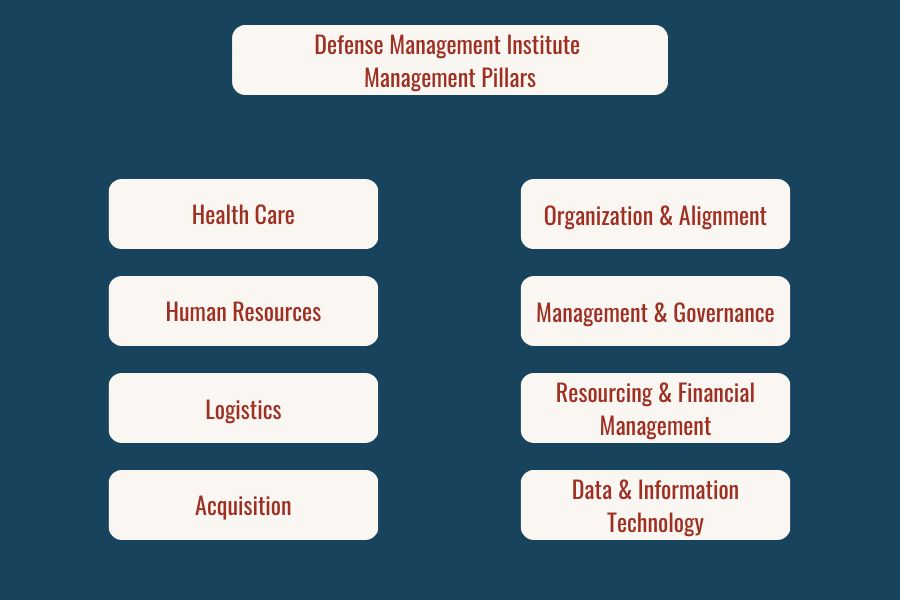The Defense Management Institute jumps into one of DoD’s thorniest management issues
When Congress abolished the role of chief management officer, it left a void that the Defense Management Institute is trying to help fill.
Six months into its mission as the think tank for Pentagon management, the Defense Management Institute (DMI) is kicking off its public-facing image. Its new website offers a look at the institute’s eight main priorities including human resources, healthcare and acquisition.
At the top of its dance card is a study of the Defense Department’s chief management officer, a position that no longer exists, but the question of whether to reinstate it is the subject of debate between the Senate and the White House.
Congress established the chief management officer position in 2018 as the third highest-ranking member on the Pentagon staff. After a critical study of the position by the Defense Business Board, Congress eliminated the job in 2021. The Senate version of the 2024 National Defense Authorization Act (NDAA) has an amendment to bring it back. A White House statement of administration policy published July 27 “strongly opposes” reinstatement of the position.
“I think the problem is understanding how that office fits into the rest of the bureaucracy — how it relates to the rest of the department is a challenge. And it’s just not the way the Department of Defense works. Giving an office nominal authority in law is not the same as actual authority and practice,” Peter Levine, director of DMI, told Federal News Network.
Levine, a former undersecretary of defense for personnel and readiness, also held the position of deputy chief management officer. He said whatever Congress decides to do about the position, it should exercise caution. Starting and stopping top-level positions can be both a distraction and an energy drain.
“Reorganization is difficult in the Department of Defense. It takes time and it distracts from the mission. The department has just gone through a lengthy period of getting rid of that chief management officer. I think Congress should consider the impact of reconstituting a new office. If you do that too quickly, you create another wave of disruption,” Levine said.
Sen. Joe Manchin (D-W.Va.) introduced the NDAA amendment to reinstate the chief management officer. He said the position need to have more authority and it was never given a chance to succeed. The White House SAP said the position was never effective.
Since its inception last January, the institute developed its organization around eight pillars of defense management and started building its program, including a document library as a reference source for studying defense management.

“We’ve got a lot of resources I think will be useful for the defense management community. We have a curated list of key resources in each of the eight defense management pillars we’ve identified. We’ve got a list of experts with bios and contact information,” Levine said. “We’ve got links to other organizations and libraries that are key to defense management issues. We’re starting up some other features like links to breaking news on defense issues and interviews with defense management leaders.”
Among other top priority issues for DMI is defense healthcare management. Levine said the institute has about 20 experts from government and academia in the field working on a review of DoD’s healthcare management systems.
“There was a significant reform of the defense healthcare system that was enacted by Congress about five or six years ago. Our experts are looking at that and taking a status check on where we’ve gone, what we’ve changed, how successful we’ve been and what remains to be done,” he said.
The institute is also working with the Pentagon on an annual review of defense agencies and field activities.
DMI is a private, non-profit organization funded in part through DoD. It is managed by the Institute for Defense Analysis (IDA) and housed in IDA headquarters in Alexandria, Virginia. The Defense Department established DMI in January to help guide its management efforts.
The institute opened its doors with a management symposium. Moving forward, Levine said he will continue planning symposium-type events to bring together management experts and create educational opportunities.
“We’re just getting to the point where we’re starting to plan a second annual symposium. We have to make this an annual event. And we’re starting to think about how we’ll structure that and what kinds of topics we’ll cover,” Levine said. “This is something that will be an ongoing initiative over a period of years and it’s something we can help the Department of Defense in its own efforts to build a community of practice around defense management.”
Copyright © 2024 Federal News Network. All rights reserved. This website is not intended for users located within the European Economic Area.
Alexandra Lohr, a former staff member, covered the Defense Department for Federal News Network until September 2023.







